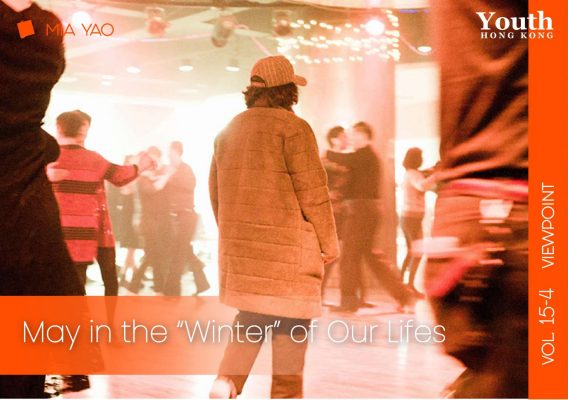//vol.15-4 Viewpoint: Movie
May
in The “Winter” of Our Lives
by Mia Yao
In an ageing society, the emotional needs and mental well-being of the older generation often go unattended. In the twilight of life, what is it that May is still in search of?
The average temperature in Shanghai from December to February is about 5 Celsius degrees, humid, cold, with occasional snow. In these depths of winter, 70-year-old Chen Yumei, also known as May, continues her routine of travelling across Shanghai every day, from the suburbs to a central location, Renmin Park, where elderly singles meet. Whether it’s the park or subway stations, she can be found waiting with her blue trolley, waiting for someone to show up.
Initially, before filming his documentary “May,” director Luo Dong initially took a dislike to his protagonist. It was not until he began shooting, that he had the opportunity to observe May’s life. He recalled, “At our first encounter, I didn’t like her; I perceived her as a snobbish Shanghai lady. However, as I got to know her, I began to discover her charm and lively personality.” “There was something poetic about May’s daily routine,” he said at the 36th Tokyo International Film Festival this past October.
In her colourful outfits, lips stained with colour, day and night, May is busy travelling the city. Whether ballroom dancing, playing Mahjong, conversing loudly in Shanghainese, or dining with men, May is always on the road. Her primary consideration for a potential partner is whether the man owns a house or is generous enough to cover her meal expenses.
As I watch, touched by her resilience and unhappy childhood, I am conflicted by a complex blend of emotions, including sympathy and dislike. Perhaps this is because as part of a younger demographic, we don’t have a familiarity of her generation’s challenges.
Born in the 1950s, May experienced periods of turmoil and material scarcity. She also grew up when the criteria of a “good” marriage was based on social status, ownership of property and wealth — before gender equality, financial independence and marrying for love became “normal.” So in a modernised and urbanised mega city like Shanghai, where inflation erodes retirement pensions, May’s generation is being left behind, physically, mentally and financially.
Divorced twice and living alone, May is trying to survive the “winter” of her life by searching for something that may not even exist. Feeling closer and closer to death every day, she refuses to stay home in the actual seasonal winter, living by the motto 「Life lies in movement.」 Her constant quest is not for love, but for something she can cling to until the end of her life.
What forms a poignant backdrop to May’s story is the rapid migration and urbanisation process, as well as an ageing population in China, issues that director Luo touches upon. As the younger generation leave their home and parents to move into the cities, the urban landscape undergoes dramatic transformations, and questions arise about what happens to those who are forced to stay behind. Who will enter their world and provide them with companionship as societal shifts alter the dynamics of community and family structures?
According to the World Health Organisation, China has one of the fastest growing ageing populations in the world. The population of people over 60 years old in China is projected to reach 28% by 2040, due to longer life expectancy and declining fertility rates. In Shanghai the elderly population aged 60 and above reached 5.42 million, accounting for 36% of the total population as of 2021.
Meanwhile in Hong Kong, the Census and Statistics Department projects that the number of elderly persons aged 65 and over will reach 2.74 million in 2046. Given that the corresponding proportion of the population is projected to increase from 20.5% to 36.0%, this means that more than one in every three Hong Kong people will be an elderly.
“May” is a documentary not only about May, but about late life crises and dilemmas faced by an ageing population in many parts of the world, including Hong Kong. With May seated at the back of an empty train, Director Luo offers us a window from where we can peep through, a bridge to foster understanding, and also a question mark to young people and society at large.
At the Hong Kong Asian Film Festival this year, the director said he had no idea whether, and how, the film will impact May’s life, or if it will have an impact on what is now a relationship crisis between her and her daughter.
However, one thing remains certain: at this very moment, May is likely still on her way to the dating corner, carrying her trolley, waiting for someone to show up. Hope springs eternal. ■


